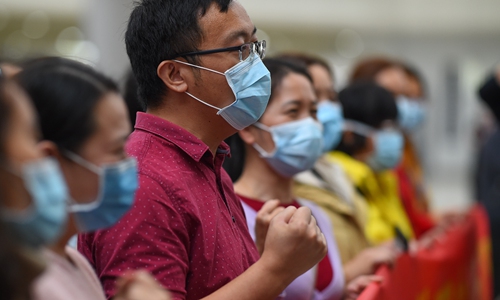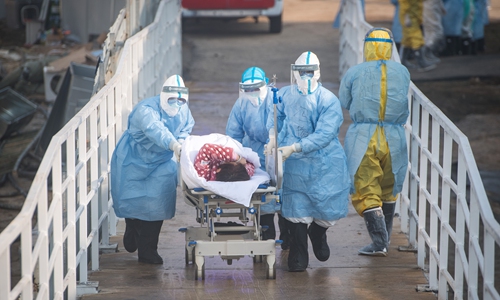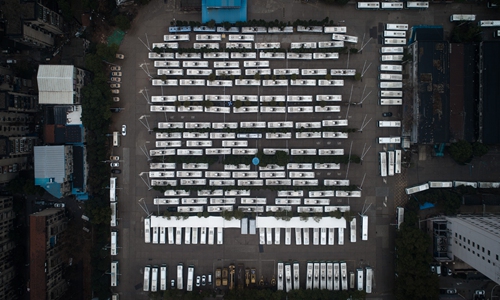HOME >> CHINA
China contains 99% of COVID-19 cases within borders through lockdowns, sacrifices
Source:Xinhua Published: 2020/2/17 14:31:23

Medical team members cheer for each other before leaving for Wuhan, at the Haikou Meilan International Airport in Haikou, south China's Hainan Province, Feb. 4, 2020. (Photo by Pu Xiaoxu/Xinhua)
The pedestrian path at the foot of the Acropolis hill in the heart of Athens was lit red on Friday evening for an hour.
Hundreds of Greeks and Chinese people living in Greece held a gathering and walked around the neighborhood holding Chinese red lanterns to express solidarity with China in the fight against the novel coronavirus (COVID-19) pneumonia outbreak.
"The world should show gratitude to the Chinese people for their courage and sacrifices in battling the disease decisively and in preventing its spread to other countries," said Fotis Provatas, president of the Chamber of Greek-Chinese Economic Cooperation, which organized the event.
Till now, China has contained more than 99 percent of the confirmed cases within its borders.
Since the outbreak, China has been taking decisive and unprecedented measures, including locking down cities, to protect public health both domestically and globally.
Thanks to the self-imposed sacrifices, the world has so far not seen a major global outbreak.
As of Saturday, when nearly 70 thousand people in dozens of countries have tested positive for infection, the number of confirmed cases of infection outside China accounts for less than one percent of the total.
"We appreciate and we admire all this gigantic effort, their determination and discipline, because they know that this is the only way to help themselves and the world from the further spread of the epidemic," Provatas said.

Medical workers help the first batch of patients infected with the novel coronavirus move into their isolation wards at Huoshenshan (Fire God Mountain) Hospital in Wuhan, central China's Hubei Province, Feb. 4, 2020. (Xinhua/Xiao Yijiu)
SACRIFICE APPRECIATED
For Mario Cavolo, an Italian American writer living in China's northeastern province of Liaoning, his family have to change their basketball routine on the weekend now by holding it indoors as part of local community efforts to control the novel coronavirus outbreak.
"If you think about the responsibility of a dutiful citizen, 1.4 billion people in China have to stay at home, doing what should be done -- not spreading the virus. It's amazing," said Cavolo, who has been living in China with his wife and child for years.
In the neighborhood where Cavolo lives, local security guards make extra efforts to register residents and take residents' body temperatures at the entrance of each residential community. "Our family realizes that we have to follow these strict rules because we are part of the community, to protect each other," he said.
While implementing the strictest measures to prevent and control the disease across the country, China is also cooperating with the international community to prepare other countries for a potential outbreak and prevent the epidemic from growing.
Michael Tiberi works with a company making LED masks in Las Vegas in the US state of Nevada, where local life is hardly affected by the novel coronavirus epidemic. He appreciates China's anti-epidemic efforts, saying "the quarantine seems to be working very well to reduce the spread of the virus and contain it in specific areas."
"I like the Chinese people and have worked with them for many years, so I greatly appreciate the sacrifices they have made to curb this potentially dangerous virus," Tiberi said.
"If it weren't for China's efforts, the number of cases outside China would have been very much higher," said Director-General Tedros Adhanom Ghebreyesus of the World Health Organization earlier this month.

Greeks and Chinese people living in Greece hold red lanterns at the foot of the Acropolis hill, Athens, Greece, Feb.14, 2020. (Xinhua/Marios Lolos)
HARD-WON PROGRESS
Since the outbreak of the epidemic, China has implemented the most comprehensive and rigorous measures to prevent and control the spread of the virus.
Wuhan city, an important transportation hub in central China and capital of Hubei Province, was locked down since Jan. 23, with all public transportation suspended. Several other cities in Hubei Province have followed suit.
To improve medical treatment capacity, tens of thousands of workers were mobilized to build two makeshift hospitals in Wuhan with a total of 2,600 beds for patients in serious condition. The construction of each hospital took only 10 days.
Provincial-level regions have paired up with cities across Hubei to provide medical aid. A total of 217 medical teams with 25,633 medical personnel have been sent to Hubei as of Friday, with a massive influx of equipment and supplies.
The unprecedented moves have yielded positive results. By the end of Saturday, the daily new confirmed cases of the disease outside Hubei have been dropping for 12 consecutive days, with the overall confirmed cases on the Chinese mainland reaching 68,500, according to China's National Health Commission.
By Saturday, a total of 1,665 people have died of the virus while 9,419 people have been discharged from the hospital after recovery.
Nancy Messonnier, director of the US Centers for Disease Control and Prevention's National Center for Immunization and Respiratory Diseases, said "China has certainly taken aggressive actions to try to mitigate the spread of this virus."
The progress is hard won by all sides and is fully recognized by the international community. So far, more than 160 leaders of foreign governments and international organizations have expressed their support for China.
"China is doing many good things that are slowing the virus, and the facts speak for themselves," Ghebreyesus said Wednesday. "This has to be recognized, and the whole world is seeing this."

Aerial photo taken on Feb. 14, 2020 shows buses at a parking lot in Wuhan, central China's Hubei Province. (Xinhua/Xiao Yijiu)
SHORT-TERM PAIN
The strong measures, though effective in mitigating the spread of the epidemic, will inevitably inflict pain on some parts of the Chinese economy and affect people's daily life.
Restaurants, shopping malls, cinemas, museums and tourist resorts in China are closed to avoid gatherings, and many factories are challenged by unexpected difficulties in operation due to quarantine arrangements.
To help businesses pull through, the Chinese government at all levels has rolled out supportive measures such as tax and rent deductions, delaying loan payments, cutting interest rates and waiving overdue interest.
International organizations and leading economists have expressed confidence that the impact on China's economy is temporary and will not alter the long-term growth trajectory.
The International Monetary Fund and the World Bank have expressed their support for China's anti-epidemic efforts, saying China's economy "remains resilient" and the Chinese authorities have policy space to respond to the outbreak.
China's economy is expected to be affected by the epidemic; however, it will be "followed by a rebound, and possibly a sharp rebound, once the virus is under control," said Stephen Roach, senior fellow at Yale University's Jackson Institute of Global Affairs.
"I'm still very optimistic on the prospects for the Chinese economy," said Roach, former chairman of Morgan Stanley Asia and chief economist at Morgan Stanley, the New York-based investment bank.
Posted in: SOCIETY